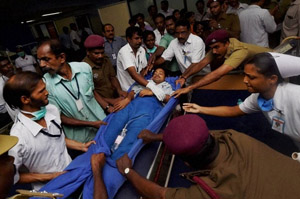 Chennai, May 2: Even after the twin blasts at the Chennai central railway station left one person dead and 14 injured, political parties did not wait for long to get into a blame game.
Chennai, May 2: Even after the twin blasts at the Chennai central railway station left one person dead and 14 injured, political parties did not wait for long to get into a blame game.
The DMK blamed Tamil Nadu Chief Minister J Jayalalithaa for going easy on terror. The BJP said that Narendra Modi did not have enough security despite him being a target for terrorists.
When asked if the BJP was unnecessarily trying to connect today's attack to Narendra Modi's safety instead of focusing on trying to solve the issue, party spokesperson Nirmala Sitharaman during a debate on CNN-IBNsaid it wasn't just speculation.
"It is not for the first time the BJP has talked about a threat to Modi. In the Hunkaar rally in Bihar we had approached the Home Minister based on reports in the media based on facts that there is a threat to Modi," she said.
"The government should be clear not to relax its guard even for a minute. This is an issue we kept alive before the elections and people in Bihar and the BJP suffered. Was that a small thing? Are you familiar with the route that the train was going to take? It was close to Modi's rally," she said.
Given even last month four terrorists were caught in Rajasthan because they were planning an attack on him, should the Congress take it the threat assessment more seriously?
"I am sure that the BJP will be much concerned about their leader. But national leaders have the privilege of security. Modi is one of the handful of people who has z-plus security. The Home Minister did say that he has been given so much security that he need not worry. Even other leaders are under threat," Congress spokesperson Ameeben Yagnik said.
Attacking the BJP she said, "Every time something happens in any corner of India they say these things. They are just making it a political issue at the time of polls."
The BJP spokesperson was of the opinion that the Congress dismissing the allegation was just symptomatic of their handling of terror activities.
"What is wrong if we want security for Modi. He is our prime ministerial candidate. How does the focus on the Chennai blast get excluded? The Congress always doesn't have to shout down at us when their performance on terrorism has been pathetic," Sitharaman argued.
Strategic Affairs Editor of The Hindu, Praveen Swamy, pointed out that instead of quibbling over the security for leaders, political parties should offer a blueprint of what they planned to do to improve security in the country.
"We can be reasonably certain that whoever did this did not think that Modi or Sonia would be in the coaches S4 and S5. We talk about more security for our railway. Reality is not just terrorism, but crime has gone up in the railways. I would like to hear politicians stop scoring brownie points and give us a blue print of what they would do. This is off the wall and childish," Swamy said.
Repeated terror attacks on trains in India proves that the railways are vulnerable. There is no frisking in stations, local or inter-state, and the metal detectors that are in place, if any, are almost always dysfunctional. This makes trains soft targets
Former Director General of Police Vikram Singh said, "We have not insulated our trains to crimes or terrorists. There have been innumerable studies, however no implementation. Any crime happening in train is the responsibility of the local police station and the local government."
"We should see to it that there is a professional and thorough investigation into the Chennai blast. Also, believe it or not we cannot dismiss the fact that there was an attack on Modi in Patna," Singh said, and added, "It is a national tragedy trains are not safe. We have to have certain sophistication. NCTC has to be in position. The terror groups move across the country. It is a national problem and not a state problem."
Even Swamy agreed with him saying that greater co-ordination was the need of the hour.
"The Tamil Nadu government and Centre cannot get together on who should probe the blast. The Patna police are incompetent because they are not trained and it is in disarray. And it is the case across the country,"Swamy said.
"The solution is for you and I to get serious and hold our leaders accountable. It will be your kids and mine who will get killed while our leaders are protected by black cats and z-plus security," Swamy said.





Comments
Add new comment